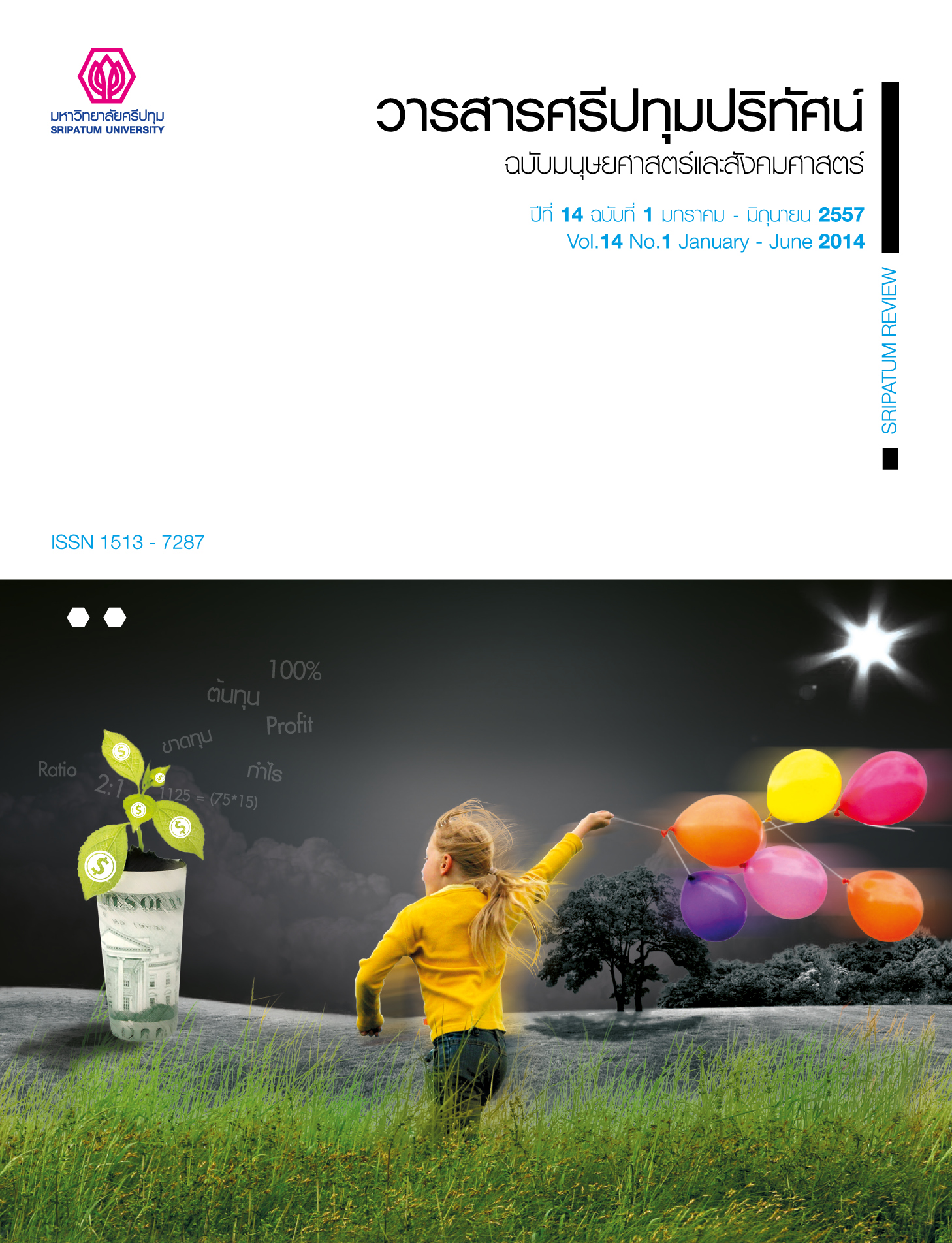FACTORS AFFECTING THE CAPABILITY OF CREATIVE THINKING IN THAI STUDENTS. A CASE STUDY: STUDENTS IN HIGHER EDUCATION INSTITUTIONS IN BANGKOK METROPOLITAN AREA
Main Article Content
Abstract
The objectives of this study are 1) to evaluate the capability level of creative thinking in Thai students; 2) to study the factors affecting the capability of creative thinking in Thai students in both state and private higher education institutions; 3) to analyze and classify factors affecting creative thinking capability in Thai students in state and private higher education institutions; and 4) to suggest guidelines for development of creative thinking capability in Thai students. The research sample consisted of 305 fourth year students in the academic year 2012. The research data were obtained by 1) using a questionnaire to collect data on factors affecting the capability of creative thinking in Thai students; 2) conducting in-depth interviews; and 3) conducting case studies. Data on factors affecting capability of creative thinking in Thai students were analyzed using the multiple regression analysis and discriminant analysis.
The research findings are as follows:
1. The overall capability of creative thinking in Thai students is rated to be at the excellent level in all aspects. Capability levels of creative thinking in state higher education institution students and private higher education institution students are significantly different at the .001, .01, and .05 levels, with the rating means in all individual aspects of creative thinking of private higher education institution students being significantly higher than counterpart rating means of state higher education institution students.
2. The factors that affect the capability of creative thinking in Thai students are learning management quality, administrator’s leadership, and clarity of policy. These factors (predictor variables) can explain the variation of creative thinking capability in Thai students (response variable) by 39.4% (R = .628, R2 = .394).
3. There are many parameters that affect the classification of factors affecting the capability of creative thinking in both state and private higher education institutions. The best parameter is “age” followed by learning management quality, tolerance, originality, parent’s level of education, clarity of policy, administrator’s leadership, parent’s income, flexibility, gender, elaboration, institute capability, analysis, evaluation, and fluency, respectively.
4. Results of qualitative research study show that there are additional factors affecting the capability of creative thinking in Thai students: (1) forum for showing creativity, (2) inspiration, (3) socialization, (4) teamwork, (5) activity promotion, (6) participation, (7) basic education learning achievement, (8) study-tour, and (9) accumulated experience, respectively..
Article Details
1. กองบรรณาธิการสงวนสิทธิ์ในการพิจารณาและตัดสินการตีพิมพ์บทความในวารสาร
2. บทความทุกเรื่องจะได้รับการตรวจสอบทางวิชาการโดยผู้ทรงคุณวุฒิ แต่ข้อความและเนื้อหาในบทความที่ตีพิมพ์เป็นความรับผิดชอบของผู้เขียนแต่เพียงผู้เดียว มิใช่ความคิดเห็นและความรับผิดชอบของมหาวิทยาลัยศรีปทุม
3. การคัดลอกอ้างอิงต้องดำเนินการตามการปฏิบัติในหมู่นักวิชาการโดยทั่วไป และสอดคล้องกับกฎหมายที่เกี่ยวข้อง
References
สุเทพ พงศ์ศรีวัฒน์. 2545. ภาวะผู้นำ : ทฤษฎีและปฏิบัติ. กรุงเทพฯ : บุคส์ลิงค์.
สำนักงานคณะกรรมการการอุดมศึกษา. 2553. เอกสารการประชุมโครงการประชุมวิชาการระดับชาติเครือข่ายวิจัยอุดมศึกษาทั่วประเทศ การพัฒนาเศรษฐกิจฐานราก ด้วยแนวคิดเศรษฐกิจเชิงสร้างสรรค์. เอกสารอัดสำเนา.
ราชกิจจานุเบกษา. 2553. พระบรมราชโองการประกาศ, แผนพัฒนาเศรษฐกิจและสังคมแห่งชาติ ฉบับที่ 11 (พ.ศ. 2555-2559). ราชกิจจานุเบกษา เล่ม 128 ตอนพิเศษ 152 ง วันที่ 14 ธันวาคม 2554.
วรเดช จันทรศร. 2554. ทฤษฎีการนำนโยบายสาธารณะไปปฏิบัติ (พิมพ์ครั้งที่ 5). กรุงเทพฯ : พริกหวานกราฟฟิคจำกัด.
วรเดช จันทรศร. 2527. การนำนโยบายไปปฏิบัติ: ตัวแบบและคุณค่า. กรุงเทพฯ : วารสารพัฒนบริหารศาสตร์. 24 (4), 535-554.
De Bono. Edward. 1990. Lateral Thinking: Creativity Step by Step. New York, NY: Harper & Row, Publishers.
De Bono. Edward. 1995. “Serious creativity”. The Journal for Quality and Participation. ABI/INFORM Global. 18 (5), 12.
Defleur, M. 1989. Theories of mass communication (5 th ed.). New York : Longman. 173.
Elmore, Richard F. 1980. “Backward Mapping: Implementation Research and Policy”. Decisions, Political Science Quarterly, 94 (4), 32.
George C Edward. 1980. Implementing Public Policy , Washington, dc: San Francisco : W. H. Freeman.
Hambleton, Robin. 1983. “Planning Systems and Policy Implementation”, Journal of Public Policy, 3 (4), 397-418.
James P. Lester, Ann O’M. Bowman, Malcolm L. Goggin, and Laurence J. O'Toole, Jr. 1987. Public Policy Implementation: Evolution of the Field and Agenda for Future Research, Policy Studies Review. 7, 200-216.
Lipsky, Michael. 1980. Street-Level Bureaucracy : Dilemmas of the Individual in Public Services, Russell Sage Foundation : New York.
MacKinnon, D. W. 2005. IPAR's Contributions to the Conceptualization and Study of Creativity. Perspectives in Creativity. Taylor, I. A. & Getzels, J. W. (Eds.). Chicago, IL: Aldine Publishing Company.
Miller, Ron. 2000. Making Connections to the World : some Thoughts on Holistic Curriculum Brandon, VT: Foundation for Educational Renewal.
Mumford, M. D., & Gustafson, S. B. 1988. Creativity syndrome: Integration, application, and innovation. Psychological Bullet in, 103, 27 – 43.
Nakamura, R. T., & Smallwood, F. 1980. The politics of policy implementation. New York: Martin's Press.
Rosenmen, M.F. 1988. Journal of Creative Behavior. Retrieved September 30, 2010.
Sorg, James D. 1983. A Typology of Implementation Behavior of Street-Level Bureaucrats : Policy Study Review. 2.
Sabatier, Paul A. and Daniel A. Mazmanian. 1980. The Implementation of Public Policy: A Framework of Analysis. Policy Studies Review Annual. 4, 181-203.
Torrance, E.Paul. 1962. Education and the Creative Potential. Minneapolis : The Lund Press, Inc.
Wallach, Michael A. , and Kogan, Nathan. 1975. Modes of Thinking in Young Children. New York : Holt, Rinehart and Winston, Inc.


